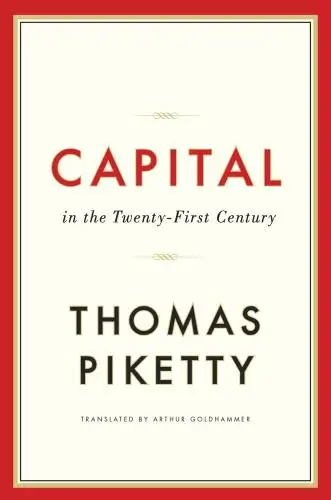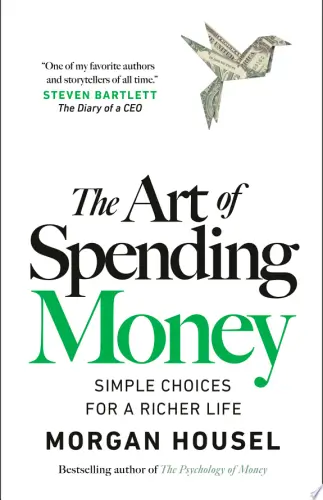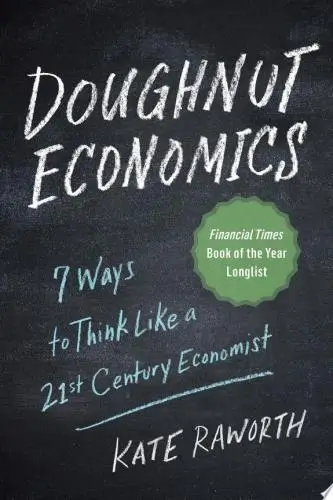
Capital in the Twenty-First Century
What's it about?
Capital in the Twenty-First Century explores the dynamics of income inequality in the modern world. It offers a deep analysis of wealth concentration and its implications for society. You'll learn about the historical trends in wealth distribution, the role of capital in the economy, and potential policies to mitigate inequality. Piketty uses a wealth of data to argue that without intervention, the gap between rich and poor is likely to widen further. This book is a crucial read for understanding the economic challenges and opportunities of our century.
About the Author
Thomas Piketty is a French economist specializing in wealth and income inequality. His seminal work, "Capital in the Twenty-First Century," employs historical data to argue that the rate of capital return in developed countries is persistently greater than the rate of economic growth, exacerbating inequality. His writing combines rigorous analysis with accessibility.
10 Key Ideas of Capital in the Twenty-First Century
The Central Contradiction: Capital's Growth Outpaces Economic Output
The core argument is that when the rate of return on capital (r) exceeds the rate of economic growth (g), wealth inequality inevitably increases.
This is because those who own capital (assets like real estate, stocks, and bonds) see their wealth grow faster than the overall economy, leading to a concentration of wealth among the capital owners.
Over time, this dynamic exacerbates economic inequality, as a smaller percentage of the population comes to own a larger share of total wealth.
Learn DeeperDiversify your investments: To benefit from the principle that capital grows faster than economic output, spread your investments across different asset classes such as stocks, bonds, and real estate. This diversification can help protect against market volatility while taking advantage of growth opportunities.
Invest in education and skills development: Since wealth accumulation can lead to increased inequality, investing in your own human capital can help you stay competitive and increase your earning potential over time. This could mean pursuing higher education, professional certifications, or learning new skills relevant to your field.
Consider passive income streams: Look into creating or investing in sources of passive income, such as rental properties or dividend-yielding stocks. This aligns with the concept of capital's growth outpacing economic output, as it allows you to benefit from capital appreciation and income generation simultaneously.
Stay informed about economic trends: Understanding the broader economic environment, including growth rates and investment trends, can help you make more informed decisions about where and how to invest your money. This knowledge can also guide you in adjusting your investment strategy to mitigate risks associated with economic downturns.
- Example
If you're currently only invested in savings accounts with low interest rates, consider reallocating a portion of your savings into a diversified portfolio of stocks and bonds. This could potentially offer higher returns over time, in line with the principle that capital tends to grow faster than the economy.
- Example
Suppose you have a skill or hobby, like woodworking or digital design. You could create an online course teaching others your skill, generating passive income while also investing in your own human capital by enhancing and sharing your expertise.
The Historical Context of Wealth Inequality
An extensive analysis of tax records and other historical data across several countries shows that wealth inequality was extremely high in the 18th and 19th centuries.
It somewhat diminished in the mid-20th century due to wars, economic policies, and social changes, but has been increasing again since the 1970s.
This pattern suggests that the periods of reduced inequality were exceptions rather than the norm.
They were largely influenced by specific historical circumstances rather than inherent economic tendencies.
Learn DeeperStay Informed About Economic Policies: Regularly read up on current economic policies and their potential impact on wealth inequality. Understanding these can help you make more informed decisions about your finances and voting choices.
Invest Wisely: Diversify your investment portfolio to include assets that historically appreciate over time, such as stocks, real estate, or retirement accounts. This can help you build wealth steadily, even in times of growing inequality.
Advocate for Fair Policies: Engage in community and political activities that push for economic policies aimed at reducing inequality. This could include supporting tax reforms, education funding, and healthcare access.
Educate Yourself and Others: Take the time to learn more about the history of economic inequality and share this knowledge with friends and family. Understanding the root causes can empower more people to advocate for change.
Plan for the Long Term: Given the historical cycles of inequality, it's wise to plan for your financial future with a long-term perspective. Consider consulting with a financial advisor to create a plan that takes into account potential economic shifts.
- Example
Joining a local group that advocates for affordable housing policies in your community, as a way to combat wealth inequality by ensuring more people have access to home ownership.
- Example
Setting up a monthly investment into a diversified index fund, which is a practical step towards building personal wealth over time, despite broader economic inequalities.
The Role of Inheritance in Perpetuating Wealth Inequality
Inheritance plays a crucial role in perpetuating wealth inequality over generations.
As wealth accumulates and concentrates in the hands of a few, it is often passed down through generations, creating a cycle where the rich get richer, not through their own efforts or economic contributions, but through the mere fact of their birth.
This undermines the meritocratic ideals that many modern societies are built upon and can stifle social mobility.
Learn DeeperEducate yourself on financial literacy: Start by understanding the basics of personal finance, investment, and wealth management. This knowledge can help you make informed decisions about saving, investing, and growing your own wealth, regardless of your starting point.
Create a long-term financial plan: Set clear, achievable goals for your financial future. Consider how you can build wealth over time through consistent savings, smart investments, and perhaps even creating additional income streams.
Advocate for policy change: Engage in or support movements that aim to reduce wealth inequality. This could involve supporting tax reforms, educational reforms, or policies that promote greater economic opportunity for all.
Consider ethical estate planning: If you are in a position to leave an inheritance, think about ways to do so that encourage hard work, education, and personal development among your beneficiaries, rather than perpetuating dependency.
- Example
A person decides to take a free online course on personal finance management. They learn about budgeting, saving, and the basics of investing, which helps them to start building their own wealth more effectively.
- Example
Another individual, concerned about wealth inequality, volunteers with a local non-profit that advocates for affordable housing. They help to raise awareness and push for policies that could provide more people with the opportunity to build wealth through homeownership.
Globalization and Tax Competition: Undermining National Tax Policies
Globalization has led to increased tax competition among countries, as governments lower taxes on capital to attract investment.
This undermines the ability of states to levy effective taxes on wealth and capital gains, contributing to growing inequality.
The mobility of capital in a globalized world means that wealthy individuals and corporations can easily move their assets to low-tax jurisdictions, reducing the tax base in higher-tax countries and limiting those governments' ability to redistribute wealth.
Learn DeeperStay informed about tax policies: Regularly update yourself on current tax laws and international tax agreements. This knowledge can help you understand the broader economic landscape and make more informed decisions about your investments and savings.
Consider ethical investing: Look into investment options that prioritize social responsibility, including companies that pay their fair share of taxes. Ethical investing can contribute to reducing inequality by supporting businesses that are committed to fair economic practices.
Advocate for fair tax policies: Engage in civic activities that push for tax reforms aimed at ensuring corporations and wealthy individuals pay equitable taxes. This could involve signing petitions, participating in discussions, or supporting organizations that lobby for these changes.
Diversify your investment portfolio: While considering ethical investing, also diversify your investments to protect against market volatility. This includes a mix of domestic and international assets, balancing between high-risk and low-risk investments.
- Example
If you're considering investing in a new tech startup, research whether the company has a history of moving profits to low-tax jurisdictions. Instead, opt for a startup that is transparent about its tax practices and contributes fairly to the economy.
- Example
Join a local community group that focuses on economic justice. These groups often organize events, workshops, and campaigns to educate the public about tax fairness and lobby for policy changes. Participating can increase your understanding and impact on these issues.
The Importance of Progressive Taxation in Addressing Inequality
A progressive global tax on capital is proposed as a solution to counteract the trend of increasing wealth inequality.
Such a tax would be more heavily weighted towards those with larger fortunes, helping to redistribute wealth more equitably.
Implementing progressive taxation on a global scale would also mitigate the issue of tax evasion and the shifting of assets to tax havens, ensuring that wealthier individuals and entities contribute their fair share to society.
Learn DeeperStay informed about tax policies: Regularly educate yourself on current tax laws and reforms in your country and globally. Understanding these can help you recognize the importance of progressive taxation and how it affects wealth distribution.
Advocate for fair tax reforms: Engage in community discussions, sign petitions, or join groups that support tax justice and the implementation of progressive tax systems. Your voice can contribute to pushing for changes that ensure a more equitable society.
Practice ethical financial management: Manage your finances in a way that aligns with the principle of equity. For those who are wealthier, this might mean willingly paying a fair share of taxes without seeking loopholes to minimize tax liabilities.
Support businesses and organizations that advocate for economic equality: By choosing where you spend your money or donate, you can indirectly support the push for a fairer tax system and a more equitable distribution of wealth.
- Example
If you're a small business owner, you could publicly advocate for progressive tax policies that support local communities and the broader economy, demonstrating how such policies benefit society as a whole.
- Example
As an individual, participating in a campaign or workshop aimed at educating the public about the benefits of progressive taxation and how it can help reduce inequality, providing a practical example of advocacy in action.
Deeper knowledge. Personal growth. Unlocked.
Unlock this book's key ideas and 15M+ more. Learn with quick, impactful summaries.
Read Full SummarySign up and read for free!
Capital in the Twenty-First Century Summary: Common Questions
"Inequality is not just an accidental by-product of economic development."
Capital in the Twenty-First Century by Thomas Piketty delves into the interplay between capitalism and inequality over centuries. The detailed historical data and analysis on wealth distribution kept me engaged, especially the discussions on income disparities, inheritance, and concentration of capital. However, some parts were a bit dense, requiring multiple readings to fully grasp the concepts.
Overall, Piketty's work is a thought-provoking and eye-opening read for anyone interested in understanding the roots of modern economic inequality. Fans of similar works like The Great Divergence by Timothy Noah or The Price of Inequality by Joseph Stiglitz would appreciate the insights in this book.
Experience Personalized Book Summaries, Today!
Discover a new way to gain knowledge, and save time.
Sign up for our 7-day trial now.
No Credit Card Needed

Similar Books

Forex Trading QuickStart Guide
Troy Noonan
The Art of Spending Money
Morgan Housel
Trading in the Zone
Mark Douglas
Doughnut Economics
Kate Raworth
A study guide for Barbara Ehrenreich's "Nickel and Dimed: On (Not) Getting By in America"
Gale, Cengage Learning
Bitcoin For Dummies
Prypto
Debt
David Graeber
The Barefoot Investor
Scott Pape
Money Has No Value
Samuel A. Chambers
Financial Peace
Dave RamseyTrending Summaries

Peak
Anders Ericsson
Never Split the Difference
Chris Voss
Smart Brevity
Jim VandeHei
The Psychology of Money
Morgan Housel
The First 90 Days
Michael D. Watkins
Atomic Habits
James Clear
Thinking, Fast and Slow
Daniel Kahneman
The Body Keeps the Score
Bessel van der Kolk M.D.
The Power of Regret
Daniel H. Pink
The Compound Effect
Darren HardyNew Books

Forex Trading QuickStart Guide
Troy Noonan
Comprehensive Casebook of Cognitive Therapy
Frank M. Dattilio
The White Night of St. Petersburg
Michel (Prince of Greece)
Demystifying Climate Models
Andrew Gettelman
The Hobbit
J.R.R. Tolkien
The Decision Book
Mikael Krogerus
The Decision Book: 50 Models for Strategic Thinking
Mikael Krogerus
Fichte
Johann Gottlieb Fichte
Do No Harm
Henry Marsh
